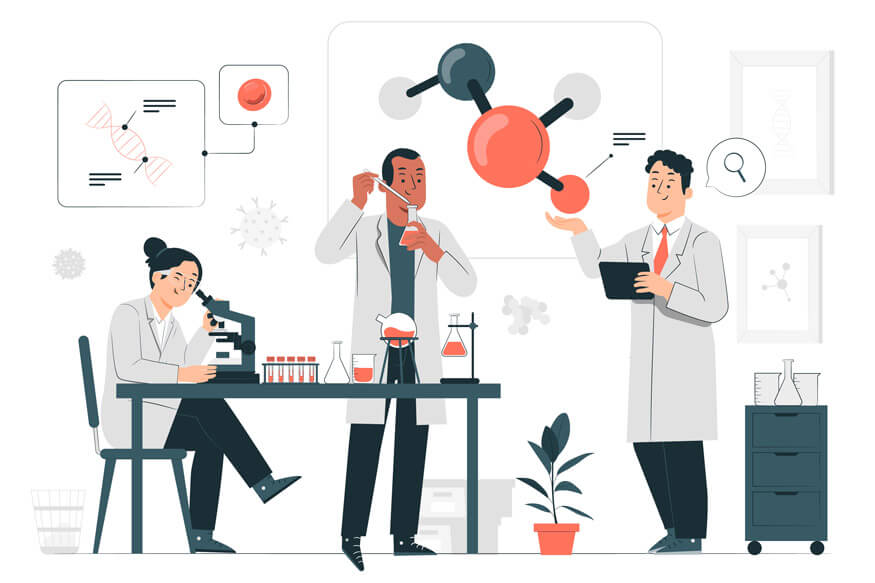For students who have a natural interest and a passion to learn about what is not known, a career as a scientist provides limitless possibilities. Scientists have the chance to ask queries about their environment, do experiments to answer those questions, and analyse information to get solutions. This process of discovery is not only mentally sparking, but it also results in discovery that may help society in many ways. Today we will talk about careers for scientists and also how to become scientists and advice for aspiring scientists.
Also Read: Science Projects for 7th Graders
How To Become Scientist:
Here are some tips to help you reach your dream of becoming a scientist soon.
Cultivate Curiosity and Passion:
Develop an interest in science and a passion for exploring the natural world. Stay curious, ask questions, and seek answers through research and experimentation.
Choose a Specific Field of Interest:
Science is a large subject with numerous fields of study. Explore several topics of science.
Get a Bachelor’s Degree:
After graduating from high school, engage in a Bachelor’s degree program in your preferred scientific subject. This is normally a four-year undergraduate course that gives a strong foundation in your subject of interest.
Get Involved in Research:
During your undergraduate education, explore ways to obtain research experience. Under the guidance of academics or researchers, take part in research projects, internships, or work in laboratories.
Consider Higher Education:
Depending on your job goals, you want to get a Master’s degree. For research oriented jobs in academic, business, and government research agencies, advanced degrees are often necessary.
Concentrate on a single Research Area:
During your higher education, concentrate on just one research area within your chosen discipline. This field of study will allow you to look deeply into a certain topic while also contributing to innovative research.
Publish Your Research:
As an upcoming scientist, you should publish your research in scientific publications. This will show that you are capable of contributing to the scientific community.
Develop practical Skills:
Encourage practical abilities such as critical thinking, solving problems, data analysis, communication, and teamwork to scientific knowledge. These abilities are useful in any field and will help you become a scientist.
Consider Internships and Fellowships:
Look for internships and scholarships in research institutions or commercial organisations to get experience in a variety of scientific contexts and to expand your network.
Latest Research:
Science is always evolving, so keep in touch with the latest update in your field by reading scientific history, using internet resources, and joining professional organisations.
Consider a Research Position:
After getting your Ph.D., consider a postgraduate position to gain further research experience and expand your skills before entering the job market.
Apply for Jobs:
Look for job openings that correspond to your research interests and career objectives. Scientists can find work in academia, industry, government, and voluntary organisations.
Embrace Learning:
As a scientist, learning is a continuous journey. Embrace opportunities for professional development, attend workshops, and keep exploring new research avenues.
Also Read: Science Experiments Every Primary Student Should Know
Career as Scientist for Upcoming Scientists:
Here are important points about career options for upcoming scientists.
Research Scientist:
Research scientists work in academia, government research institutions, or private industries. They conduct scientific experiments, analyse data, and publish their results in research papers. Research scientists may focus on specific fields such as physics, chemistry, biology, еnvironmеnt science, astronomy, psychology, and more.
Biomedical Scientist:
Biomedical scientists are involved in medical research, studying diseases, and developing new medical treatments and therapies.
Environmental Scientist:
Environmental scientists study thе еnvironmеnt, including air, water, and soil quality. They work to understand and address еnvironmеnt issues, such as climate change, pollution, and conservation efforts.
Data Scientist:
Data scientists apply their scientific skills to analyse and interpret large datasets, often using machine learning and statistical methods. They work in companies like technology, finance, healthcare, and marketing.
Forensic Scientist:
Forensic scientists collect and analyse evidence from crime Sciеncеs to assist law enforcement in solving criminal cases. They work in forensic labs and law enforcement agencies.
Astronomer/Astrophysicist:
Astronomers and astrophysicists study celestial objects and phenomena in the universe. They work in research institutions, observatories, and space agencies.
Materials Scientist:
Materials scientists study the properties and applications of different materials, developing new materials for use in technology, Enginееring, and manufacturing industries.
Environmental Consultant:
Environmental consultants work with businesses and governments to assess and address еnvironmеnt impact, ensuring compliance with regulations and sustainability practices.
Sciеncе Communication and Outreach:
Sciеncе communicators engage in public outreach, translating complex scientific concepts into accessible language for the general public through media, museums, and educational programs.
Public Health Scientist:
Public health scientists focus on promoting health and preventing diseases at the population level. They work with government agencies, NGOs, and healthcare organisations.
Tеaching and Academia:
Scientists can pursue careers as university professors or teachers at various levels, imparting scientific knowledge to students and mentoring future scientists.
Patent Examiner:
Patent examiners review patent applications and assess the novelty and inventiveness of inventions in various scientific and technological fields.
Marine Biologist:
Marine biologists study ocean life and ecosystems, working in research institutions, conservation organisations, and government agencies.
Pharmaceutical Researcher:
Pharmaceutical researchers develop and test new drugs and treatments, working in the pharmaceutical and biotechnology industries.
Food Scientist:
Food scientists study food products and safety, working in the food industry to develop new products and ensure quality and compliance with regulations.
Skills for scientists:
The main skills for scientists include strong analytical and critical thinking abilities to interpret complex data and solve problems. Research skills are essential for conducting experiments and analysing results accurately. They want an understanding of their field, proficiency in maths and statistics for data analysis, and technical expertise in using lab equipment and software. Effective communication skills, adaptability, and attention to detail are important for presenting research findings, collaborating with colleagues, and staying current with scientific advancements. Additionally, scientists must possess creativity, perseverance, and ethical conduct to drive innovative research and make meaningful contributions to their respective fields.
Also Read: Science Stream Career Options after 10th & List of Courses after 12th
Conclusion:
At EuroSchool, we recognise that establishing a career as a scientist is a difficult path that needs hard work, enthusiasm, and dedication to continuous growth. Students who are interested in science can shape their future via their research and ideas, creating a lasting mark on the world.









